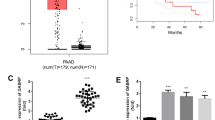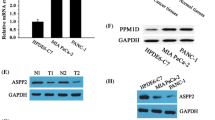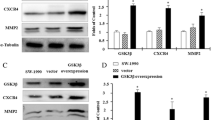Abstract
Background
CXCR4 and glycogen synthase kinase-3β (GSK3β) promote proliferation and invasion of pancreatic cancer. Inhibition of CXCR4 suppresses GSK3β expression. However, the molecular mechanism by which CXCR4 contributes to human pancreatic cancer metastasis is not completely understood. In this study, therefore, we analyzed the effect of CXCR4 on GSK3β expression and its molecular mechanism.
Methods
PANC-1 and SW-1990 cells were used in this study. PANC-1 and SW-1990 cell lines which stably expressed upregulated or downregulated CXCR4 were used for further study. Western blotting was employed to detected the expression of CXCR4, GSK3β and MMP-2. Cell invasion assay was used to detect the effect of the Akt pathway on CXCR4-induced GSK3β expression.
Results
Overexpression of CXCR4 promoted GSK3β expression and silencing of CXCR4 suppressed GSK3β expression. Overexpression of CXCR4 activated cyclin D1 and p-Akt expression, but inhibited p21 expression. Silencing of CXCR4 had the reverse effect. CXCR4 promoted GSK3β expression and PANC-1 invasion by Akt signaling. CXCR4 upregulated GSK3β expression, at least in part, at the level of transcription.
Conclusions
CXCR4 promotes GSK3β expression via the Akt cell signaling pathway in pancreatic cancer cells.




Similar content being viewed by others
References
Wörmann SM, Algül H (2013) Risk factors and therapeutic targets in pancreatic cancer. Front Oncol 3(282):1–17
Shen B, Zheng MQ, Lu JW, Jiang Q, Wang TH, Huang HE (2013) CXCL12-CXCR4 promotes proliferation and invasion of pancreatic cancer cells. Asian Pac J Cancer Prev 14(9):5403–5408
Wang Z, Ma Q, Li P, Sha H, Li X, Xu J (2013) Aberrant expression of CXCR4 and β-catenin in pancreatic cancer. Anticancer Res 33(9):4103–4110
Wu PF, Lu ZP, Cai BB, Tian L, Zou C, Jiang KR, Miao Y (2013) Role of CXCL12/CXCR4 signaling axis in pancreatic cancer. Chin Med J (Engl) 126(17):3371–3374
Grzesiak JJ, Smith KC, Burton DW, Deftos LJ, Bouvet M (2005) GSK3 and PKB/Akt are associated with integrin-mediated regulation of PTHrP, IL-6 and IL-8 expression in FG pancreatic cancer cells. Int J Cancer 114(4):522–530
Pan F, Ma S, Cao W, Liu H, Chen F, Chen X, Shi R (2013) SDF-1α upregulation of MMP-2 is mediated by p38 MAPK signaling in pancreatic cancer cell lines. Mol Biol Rep 40(7):4139–4146
Wang Z, Ma Q (2007) Beta-catenin is a promising key factor in the SDF-1/CXCR4 axis on metastasis of pancreatic cancer. Med Hypotheses 69(4):816–820
Wu D, Pan W (2010) GSK3: a multifaceted kinase in Wnt signaling. Trends Biochem Sci 35(3):161–168
Kitano A, Shimasaki T, Chikano Y, Nakada M, Hirose M, Higashi T, Ishigaki Y, Endo Y, Takino T, Sato H, Sai Y, Miyamoto K, Motoo Y, Kawakami K, Minamoto T (2013) Aberrant glycogen synthase kinase 3β is involved in pancreatic cancer cell invasion and resistance to therapy. PLoS One 8(2):e55289
Cho IR, Koh SS, Min HJ, Kim SJ, Lee Y, Park EH, Ratakorn S, Jhun BH, Oh S, Johnston RN, Chung YH (2011) Pancreatic adenocarcinoma up-regulated factor (PAUF) enhances the expression of β-catenin, leading to a rapid proliferation of pancreatic cells. Exp Mol Med 43(2):82–90
Ling X, Spaeth E, Chen Y, Shi Y, Zhang W, Schober W, Hail N, Konopleva M, Andreeff M (2013) The CXCR4 antagonist AMD3465 regulates oncogenic signaling and invasiveness in vitro and prevents breast cancer growth and metastasis in vivo. PLoS One 8(3):e58426
Zhang R, Pan X, Huang Z, Weber GF, Zhang G (2011) Osteopontin enhances the expression and activity of MMP-2 via the SDF-1/CXCR4 axis in hepatocellular carcinoma cell lines. PLoS One 6(8):e23831
Puchert M, Engele J (2014) The peculiarities of the SDF-1/CXCL12 system: in some cells, CXCR4 and CXCR7 sing solos, in others, they sing duets. Cell Tissue Res 355 (2):239-53
Sun YX, Wang J, Shelburne CE, Lopatin DE, Chinnaiyan AM, Rubin MA, Pienta KJ, Taichman RS (2003) Expression of CXCR4 and CXCL12 (SDF-1) in human prostate cancers (PCa) in vivo. J Cell Biochem 89(3):462–473
Saur D, Seidler B, Schneider G, Algül H, Beck R, Senekowitsch-Schmidtke R, Schwaiger M, Schmid RM (2005) CXCR4 expression increases liver and lung metastasis in a mouse model of pancreatic cancer. Gastroenterology 129(4):1237–1250
Thomas RM, Kim J, Revelo-Penafiel MP, Angel R, Dawson DW, Lowy AM (2008) The chemokine receptor CXCR4 is expressed in pancreatic intraepithelial neoplasia. Gut 57(11):1555–1560
Billadeau DD, Chatterjee SS, Bramati P, Sreekumar R, Shah V, Hedin K, Urrutia R (2006) Characterization of the CXCR4 signaling in pancreatic cancer cells. Int J Gastrointest Cancer 37(4):110–119
Shen X, Artinyan A, Jackson D, Thomas RM, Lowy AM, Kim J (2010) Chemokine receptor CXCR4 enhances proliferation in pancreatic cancer cells through AKT and ERK ependent pathways. Pancreas 39(1):81–87
Park HD, Lee Y, Oh YK, Jung JG, Park YW, Myung K, Kim KH, Koh SS, Lim DS (2011) Pancreatic adenocarcinoma upregulated factor promotes metastasis by regulating TLR/CXCR4 activation. Oncogene 30(2):201–211
Mamaghani S, Patel S, Hedley DW (2009) Glycogen synthase kinase-3 inhibition disrupts nuclear factor-kappaB activity in pancreatic cancer, but fails to sensitize to gemcitabine chemotherapy. BMC Cancer 9:132
Acknowledgments
This work was supported by the Innovation Team Fund of Huai’an First People’s Hospital, Nanjing Medical University.
Conflict of interest
The authors declare that they have no conflict of interest.
Author information
Authors and Affiliations
Corresponding author
About this article
Cite this article
Ma, S., Li, Q. & Pan, F. CXCR4 promotes GSK3β expression in pancreatic cancer cells via the Akt pathway. Int J Clin Oncol 20, 525–530 (2015). https://doi.org/10.1007/s10147-014-0740-0
Received:
Accepted:
Published:
Issue Date:
DOI: https://doi.org/10.1007/s10147-014-0740-0




